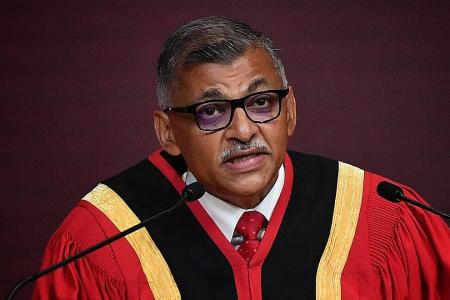Judges not infallible, but corrective systems work well: Chief Justice
Chief Justice Sundaresh Menon, in giving his first comments on the high-profile Parti Liyani case, said yesterday a sound system of justice begins with the selection of judges - but they are not infallible.
However, corrective procedures such as appeals are in place - and work well - to set right what might have initially gone amiss, he said in his speech to mark the opening of the legal year.
The annual event was conducted via video conference for the first time.
Chief Justice Menon, Attorney-General Lucien Wong and Law Society president Gregory Vijayendran delivered their customary speeches from the State Courts' Havelock Hall, with the proceedings live-streamed to about 1,000 participants.
The case of Ms Parti, a former domestic worker who was accused of stealing from the family of her employer, was mentioned by all three speakers.
Ms Parti was initially convicted by a State Courts judge after a trial, but last September, High Court judge Chan Seng Onn allowed her appeal and acquitted her. The case sparked public outcry, which led to a marathon nine-hour parliamentary debate over the fairness of the criminal justice system.
In his speech, the Chief Justice said the quest for a sound system of justice begins with the selection of judges with the appropriate temperament, ability, and integrity and commitment to carry out their heavy responsibilities.
Even so, judges are not infallible.
"That is precisely why virtually all judicial structures in the world incorporate a system of corrective procedures such as appeals, so that where something might have gone amiss at first instance, there is the opportunity to set it right," he said.
However, the Chief Justice added that "we must constantly look beyond the fact that we have corrective court procedures that work well". Thus, the judiciary has also been working on enhancing training and development programmes for judges and judicial officers in recent years.
The Singapore Judicial College, founded in 2015, is an integral part of the judiciary, running a growing calendar of programmes and developing a competency framework to enhance training of judicial officers.
Meanwhile, Mr Wong acknowledged that imperfections in the past year exposed his organisation to intense scrutiny and criticism.
But he pledged that the Attorney-General's Chambers (AGC) will do better in carrying out its fundamental duty to assist the court in making the correct decision. He also made it clear he would not allow the fear of failure or public backlash to stand in the way of AGC's duty of prosecuting worthy cases fairly.
FOR MORE, READ THE STRAITS TIMES
Get The New Paper on your phone with the free TNP app. Download from the Apple App Store or Google Play Store now


